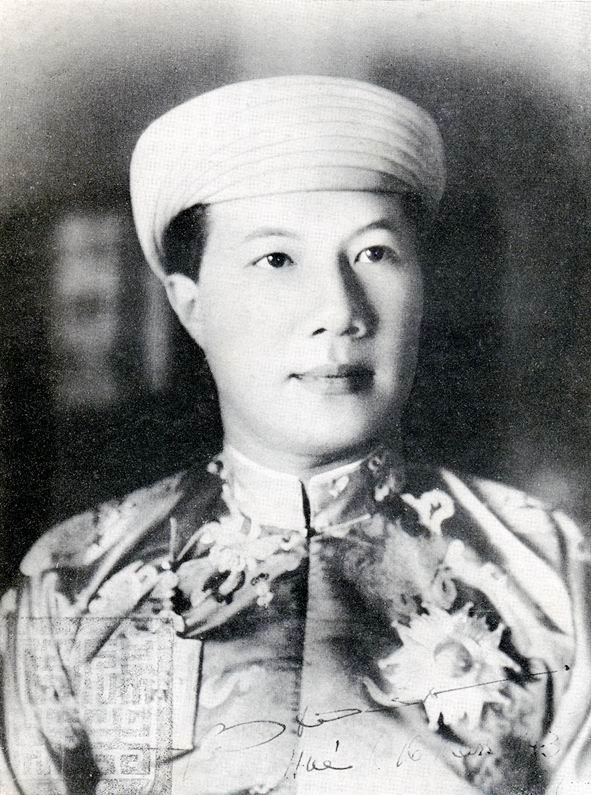 |
| Emperor Bao Dai |
Prince Nguyen Vinh, later known as Emperor Bao Dai, was the son of Annamese emperor Khai Dinh. Born in Hue on October 22, 1913, Bao Dai was educated in France. He became emperor of Vietnam on November 6, 1925. On his ascension to the throne he took the name Bao Dai, meaning "Keeper of Greatness."
After taking the throne he returned to France and resumed his education, and the regent Ton-Thai Han served until he came of age in 1932. Bao Dai married Jeanette Nguyen Huu Hao on March 24, 1934. As the empress Nam Phuong, she bore him two sons and three daughters.
Bao Dai was a reformer, seeking to modernize Vietnamese educational and judicial systems and to end archaic court practices such as the kowtow, and he put young reformers in his first cabinet of 1933. However, the French government continually undermined his initiatives and his authority.
  |
In the mid-1930s, with France threatened by Germany, Bao Dai saw his opportunity to seek greater autonomy. When Germany conquered France the new French government at Vichy was compelled to surrender Indochina to Japanese control. Japan declared that it had freed Vietnam from foreign rule.
Under Japanese control Bao Dai established a nationalist government. Although he declared Vietnamese independence, in reality Vietnam switched from French to Japanese control. Under Japanese occupation a communist resistance formed led by Ho Chi Minh communist guerrillas called the Vietminh.
At the Potsdam Conference in 1945, the Allied leaders Franklin Roosevelt, Winston Churchill, and Joseph Stalin agreed that Vietnam would be divided between Chinese and British control after the war. A month after the Japanese surrender in August 1945, Ho Chi Minh announced the creation of the Democratic Republic of Vietnam. Vietnam became a battleground among the Vietminh, royalists, democrats, and supporters of the French.
Bao Dai stepped down to avert a civil war and in March 1946 went into exile in Hong Kong. However, France returned him as a constitutional monarch in an attempt to unify Vietnam. Bao Dai was hesitant, but French agreement to recognize the independent Vietnam led him to return.
In 1948 Bao Dai agreed to lead a unified Vietnam under the French Union, received permission to return, and became head of state in 1949. But he soon left Vietnam for Europe, vowing never to return until his country was truly independent.
In 1954, when France lost the crucial battle at Dien Bien Phu against the Vietminh, it finally agreed to grant independence to Indochina. At Geneva in June 1954, representatives of the United States, the Soviet Union, China, Britain, and France met to decide how to end conflict in Vietnam.
They agreed to divide Vietnam at the 17th parallel, with Ho Chi Minh ruling the north and Ngo Dinh Diem ruling the south as prime minister under Bao Dai. The Vietnamese could choose whether to live in the north or south. By July 1956 an election would be held to determine whether Vietnam would be unified.
With U.S. backing Ngo Dinh Diem held a plebiscite on whether to abolish the monarchy in October 1955. The United States opposed Bao Dai because he was out of touch, and supported Diem. American adviser Colonel Edward Lansdale suggested that ballots should be in two colors in hope that the Vietnamese would vote based on their beliefs that red meant good luck while green meant misfortune.
Voters complained that they were harassed at the polls, with ballots for Diem counted and votes for Bao Dai tossed into the trash. Diem won 99 percent of the vote. Bao Dai lost the election and went into exile in France. In exile Bao Dai spoke often on behalf of peace and unity for Vietnam, but he lived the life of a playboy. He died in a Paris military hospital on July 31, 1997.